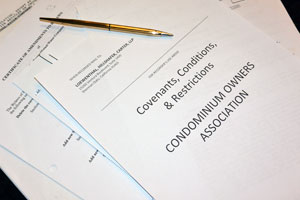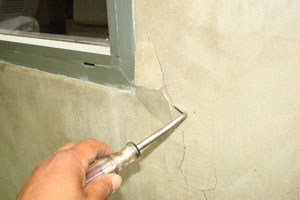LHC Newsletter Vol. 6, No. 6
“REVIEW OF COURT DECISIONS IMPACTING COMMUNITY ASSOCIATIONS IN 2012”
Pinnacle Museum Tower Association v. Pinnacle Market
Development (2012) 55 Cal. 4th 223
By: David A. Loewenthal
Robert D. Hillshafer
Facts:
The developer of a condo project included in the recorded CCRs a provision which required that all construction defect claims by the Association against the developer be resolved through binding arbitration rather than through a Superior Court jury trial. The CCRs made specific reference to the Federal Arbitration Act. The Association filed a construction defect lawsuit and the developer filed a motion to compel arbitration pursuant to the CCRs provision, contending that the Association was bound to the provisions of the recorded CCRs. Association opposed the motion based on the fact that the CCRs were put in place before the corporation (Association) was even in place and no negotiation of terms was possible and that it fundamentally deprived the Association of its constitutional right to a jury trial. The trial court and the Court of Appeal held that the arbitration provision was unenforceable, following the rationale in several prior appellate decisions, because the Association had not consented to limit its constitutional rights.
Decision by the Supreme Court:
The Supreme Court reversed the decision and determined that the mandatory arbitration provision was binding on the Association. The basis for this decision was fundamentally based on the wording of the provision in the CCRs with its specific reference to the Federal Arbitration Act, which preempts California law and policies favoring preservation of the right to a jury trial without the express consent of all parties to an agreement. The several prior decisions which voided the mandatory arbitration provisions did not involve provisions specifically invoking the FAA.
However, in an attempt to rationalize its application of the preemption doctrine in this context, the Supreme Court backed in to an analysis that concluded that the Association’s “consent” to arbitration was implied through its member’s agreeing to purchase subject to the recorded CCRs. The Court basically ignored the fact that the Association is a legal entity separate and apart from its members that has legal rights and obligations, including the right to sue on its own behalf and to have a jury trial and determined that the combination of the recorded CCRs, the fact that arbitration was not inherently unconscionable to the Association and was not inconsistent with the Davis Stirling Act, was sufficient to justify enforcing a contractual provision that the Association never consented to.
Why this is significant:
Developers will now include the “magic words” Federal Arbitration Act in the context of construction defect dispute resolution in CCRs, thereby removing a fundamentally powerful tool of Association’s legal counsel to settle such cases for their clients. Attorneys who represent Associations as plaintiffs in these cases universally prefer the option of a level playing field created by a trial by a jury of ordinary citizens over the arbitration procedure where a single person (generally a retired judge) decides all the issues, and is paid hourly by both sides to do so. Developers put these provisions in CCRs because they believe it substantially benefits their position because it forces Association’s to spend more money and because arbitrators (who the developer has to consent to) are inherently more conservative in awards than juries.
It is also a significant decision because it will probably embolden developers to seek to compel arbitration even when the provision doesn’t mention the FAA, in reliance on the Court’s analysis that the corporation’s consent can be implied through its member’s constructive knowledge of the terms of the CCRs through recording. This will necessarily slow down the process and increase the costs to the Association to prosecute a claim, both of which benefit developers.
Glen Oaks Estates Homeowners Association v. Re Max
Premier Properties, Inc. (2012) 203 Cal. App. 4th 913
Facts:
Association filed a lawsuit for damages caused by a slope failure on Association common area against the real estate brokers for the developers of the project. The suit was based on allegations that the brokers were privy to soils reports and information regarding same that the reports were unreliable, and withheld such reports from the Association and its members. The Association claimed that its members would not have purchased in the project had they been provided the information and hence would not have been responsible for the costs of repairing the damage. The Brokers challenged the Association’s standing to assert such claims because the Association had no contractual privity with the Brokers and did not owe any duty to the Association. The trial court agreed with the Brokers and the Association appealed.
Decision by the Appeals Court:
The Court of Appeals reversed the decision based on its interpretation of Civil Code Section 1368.3, which provides Associations with legal standing to assert claims and file lawsuits in certain types of matters. Prior to this decision, Civil Code Section 1368.3 had not been the basis for suits in the construction defect context against parties other than the developer, general contractor and subcontractors that built the project. The Court interpreted this statute as not having limits as to “whom” was being sued, but rather just limited the types of matters which the Association could pursue independently. The Court held that because the matter sued over involved damage to the common areas which is specifically identified in the statute, that provided standing to the Association against any party even absent contractual privity.
Why is this significant?
Although it does not expand the duty of care of brokers, the decision does eliminate one technical challenge to an Association’s attempt to broaden the scope of responsibility for construction defects beyond the conventionally responsible parties such as builders and contractors pursuant to Civil Code Section 1368.3.
Girardi v. San Rafael Homeowners Association (2012) Cal. Unpub. Lexis 1421
Facts:
Association was sued by a member whose home had been burglarized several times resulting in a claimed loss of over $1,000,000.00 in jewelry and a watch. The suit alleged that the Association was negligent in providing security to the development because of its failure to hire a security guard, install security gates, security cameras, and replace broken street lights. Association filed a motion for summary judgment based partially on the lack of evidence as to whether the unidentified burglars were authorized to enter onto Association property. The Association’s argument was that if the criminals were authorized to enter into the development, no amount of security to keep criminals out would have prevented the burglary and theft. The Association also argued that it owed the Association no duty to protect Girardi’s property from criminal acts of third parties. The only evidence presented by Girardi was an expert opinion by a security expert who opined that had there been appropriate security, the burglaries would not have occurred. The trial court granted the Association’s motion for summary judgment.
Decision by the Appeals Court:
The Court affirmed the granting of the Association’s motion for summary judgment because Girardi had failed to raise a triable issue of fact as to causation. It was Girardi’s burden to establish that the negligence of the Association in failing to provide a certain level of security was a legal cause of the injury to the Girardi’s. The Court found that the expert opinion was insufficient to attribute the cause of the loss to the Association’s failure to provide a certain level of security measures. If Girardi was unable to determine who the criminals were or when the crimes were committed, there is no factual basis for an opinion that any failure of the Association caused or contributed to the injury caused by the burglaries.
Why is this significant?
Association members who have been injured are always looking for a way to blame the Association for their misfortune and over the years, claims for lack of security have increased substantially against Associations. There have been some cases in which Association’s have been held responsible for not taking reasonable steps to protect members in light of potentially serious threats of harm and as such, Boards and managers must take reasonable steps to address security issues, including communications with members concerning the Association’s limited resources for security and the need for individual diligence.
Quail Lakes Owners Association v. Kozina (2012) 204 Cal. App. 4th 1132
Facts:
Association filed a petition seeking approval of a CCR amendment by the Superior Court under Civil Code Section 1356 that was not approved by the requisite percentage of homeowners. A member of the Association opposed the petition on the ground that the Association had denied him due process because it had not provided the requisite 15 days notice to the members such that other owners were not given adequate time to file opposition to the petition. The Association argued that the objecting member’s due process rights were not violated because he timely filed opposition and because a member does not have standing to assert due process rights of other members. The trial court granted the petition and the member appealed.
Decision by the Appeals Court:
The Court affirmed the trial court’s granting of the Association’s petition. The Court found that Kozina’s due process rights were not violated because he did file an opposition. The Court further found that the Association is the de facto representative of its members, and other members could have achieved standing for themselves by moving to vacate the order granting the petition. The Court ruled that due process rights must be asserted by an individual and that one member cannot assert a violation on behalf of other members.
Why is this significant?
While in certain instances one member can assert “claims” against the Association on behalf of other members, violations of due process are not included.
Dinh Ton That v. Alders Maintenance Association (2012)
206 Cal. App. 4th 1419
Facts:
Association was sued by a member who was challenging an election. In addition, the lawsuit alleged that the Association was a “business establishment” that was subject to the Unfair Competition Law set forth in the Business and Professions Code (Section 17200 et. seq.). This set of laws allows civil penalties to be imposed against violating businesses. The Association sought to have the case dismissed because it was brought beyond the one year statute of limitations and because the Association was not a “business” for purposes of the Unfair Competition Law. The trial court agreed with the Association and dismissed the action. The member appealed.
Decision by the Appeals Court:
The Court affirmed the decision on both grounds asserted by the Association, finding that the statute of limitations had expired and that the Association did not qualify as a business under the Unfair Competition Law because the activity (election) in dispute was not commercial and the Association did participate as a business in the commercial market. The Court ruled that the one year statute of limitations regarding elections starts to run on the date that the disputed election occurred.
Why is this important?
Because it clearly eliminates an unfair business practice claim against Associations, which is probably not covered under the Association’s master insurance policy or Directors and Officers policy.
Silk v. Feldman (2012) 208 Cal. App. 4th 547
Facts:
An incumbent director of an Association running for re- election sent a letter to all Association members which accused another candidate (a former director) of engaging in self-dealing while on the Board relative to obtaining parking spaces for her personal use. Specifically the letter alleged that the former director “cut secret deals” to purchase parking spaces without the knowledge of the Association’s attorney and other board members. The former director sued the incumbent director for defamation.
The incumbent director claimed that the statements in his letter were protected free speech in relation to an issue of public interest and moved to dismiss the lawsuit as a strategic lawsuit against public participation (“SLAPP”). California has a statute, known as the Anti-SLAPP statute which is designed to protect persons from being sued for activities which are in furtherance of the person’s right of petition or free speech under federal or state Constitutions in connection with a public issue, unless the court determines that the party suing has a probability of prevailing on the claim.
Decision by the Appeals Court:
Generally the Court held that the statements in the letter against the former director may qualify for protection as free speech within the meaning of the Anti-SLAPP statute, the court denied the motion to dismiss because the former director introduced compelling evidence that the allegations were false and as such stood a probability of prevailing on the claim on its merits. The former director (who was an attorney) submitted evidence which completely disproved the allegations against her.
Why is this important?
Because it is not uncommon for Association members to make unfounded allegations against each other or against sitting directors, often accusing them of criminal activities such as embezzlement or fraud, it is important for Boards and managers to be proactive in attempting to prevent this from occurring and to avoid “re-publication” of defamatory material so as to avoid potential financial liabilities for defamatory statements. For example, if the Association’s election process allows each candidate to submit a “candidate statement” for distribution by the Association to all members, if the candidate statement submitted by the candidate contains defamatory material and the Association distributes it to the membership, the Association could be found liable as a “republisher” of defamatory material. Although Civil Code Section 1363.03 prohibits censorship of election material by the Association, this does not mean that the Association is obligated to “re-publish” potentially defamatory accusations submitted by one candidate. If such a situation were to arise, the Association should decline to disseminate any candidate materials to its members and require that candidates do that on their own.
© 2012 by Loewenthal, Hillshafer & Carter, LLP. All rights reserved. Permission is granted to reproduce or transmit in any form any part of this newsletter as long as proper attribution to Loewenthal, Hillshafer & Carter, LLP is given. Due to the rapidly changing nature of the law, information contained in this publication may become outdated. As a result, lawyers and all others using this material must research original sources of authority.


